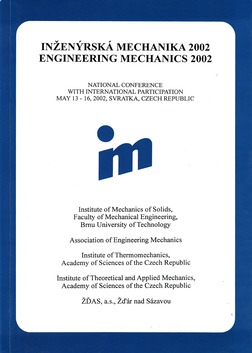Proceedings Vol. 8 (2002)

INŽENÝRSKÁ MECHANIKA 2002
ENGINEERING MECHANICS 2002
May 13 – 16, 2002, Svratka, Czech Republic
Copyright © 2002 Institute of Mechanics of Solids, Faculty of Mechanical Engineering, Bruno University of Technology, Brno
ISSN 1805-8248 (printed)
ISSN 1805-8256 (electronic)
list of papers scientific commitee
pages 281 - +10p., full text
EUCOR, a corundo-badelleyit material, which is not only resistant to wear but also to extremely high temperatures, is seldom discussed in literature. The solidification and cooling of this ceramic material in a non-metallic mould is a very complicated problem of heat and mass transfer with a phase and structure change. Investigation of the temperature field, which can be described by the 3D Fourier equation, is not possible without the engagement of a numerical model of the temperature field of the entire system-comprising the casting, the mould and the surroundings. A temperature field had been investigated on a 350x200x400 mm block casting-the so-called "stone"-with a riser of 400 mm using a numerical model with graphical input and output. The computation included the automatic generation of the network, and the successive display of the temperature field using iso-zones or iso-lines. The thermophysical properties of the cast, as well as the mould materials, were gathered and the initial derivation of the boundary conditions was conducted on all boundaries of the system. The initial measurements were conducted using thermocouples in a limited number of points. The paper provides results of the initial computation of the temperature field, which prove that the transfer of heat is solvable, and also that using the numerical model it is possible to optimise the technology of production of this ceramic material, which enhances its utilisation. The results are complemented with an approximated measurement of the chemical heterogeneity of EUCOR.
back to list of papers
Text and facts may be copied and used freely, but credit should be given to these Proceedings.
All papers were reviewed by members of the scientific committee.

 Powered by
Imce 3.20 © 2023, Pavel Formánek, Institute of Thermomechanics AS CR, v.v.i. [generated: 0.0107s]
Powered by
Imce 3.20 © 2023, Pavel Formánek, Institute of Thermomechanics AS CR, v.v.i. [generated: 0.0107s]